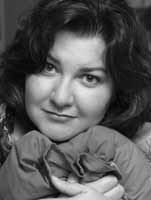October 14, 2004
Mind if I Whine? :0)
What do I have to say? I want to post something. I know!!
What’s worse than rejections? Not hearing back at all! When do you know to write a submission off as a bust? This is another reason why I must, must simsub. It’ll take years of submitting to get a decent number of poems accepted. And I think my work is pretty okay. :0)
I’m just now sending out my first manuscript, and I want a LONG pageful of acknowledgements, people!
There I feel better now. I’m off to sulk and watch one of the many CSI shows that I’ve TiVo-ed.
Oh yea, Lord, I am grateful for my loving husband, my precious pup, and my two obnoxious kitties. (No kids. Not yet, anyway.)
October 13, 2004
Gut-wrenching Fear
I’ve been reading Victoria Chang’s blog about readings. Specifically the publicity after your first book. I can’t even think about readings without feeling sick. I want to share my poetry, just not out loud. Wuss! There I said it. I’ve just never gotten used to speaking in public. And I’ve never practiced embodying my poems. I can do it in my head, but that won’t get me anywhere. One idea is to work with a local poet to help me with the performance aspect. Also, my husband is going to set me up with a mic, so I can practice reading and listening to myself recorded. A short-term goal is to post a couple of audio files here on my website. This all leads me to wonder about long-term goals. Take baby steps, so, for example, I could have read one poem at Dodge in the Open Reading tent. As I sat listening to folks read, I could feel the powerful urge to want to get up there, but I had conveniently forgot to bring any copies of my work with me. Could I have if I had brought a copy? Or would I have sat there in the audience unable to concentrate, folding my poem into smaller and smaller squares. Anyway, so I’m nearing 40 and I thought I was supposed to stop caring so much about what others thought of me. I’m ready for that now, please. If I’m going to get older, then I might as well start gaining some wisdom. I’m more ready for the phase where I don’t care what I think. And there’s no point in tracing this fear back to any particular childhood tragedy, because on Oprah yesterday Tatum O’Neill revealed all sorts of shit and she’s still written a tell-all book and is out promoting it. I can’t even imagine posting this silly blog that few will read, but I will. What is my excuse? I’m a very private person. Ha! More likely, I’m a very sick person! *wink* So, I won’t be scheduling any readings. At least not for now! We’ll see what happens when I turn 39 next month. Maybe something physical will happen. Hmm…is there a pill to help me with this fear? Cause I’ll swallow it.
October 11, 2004
35 Anniversary for SPD
This weekend was the 35th Anniversary for Small Press Distribution (SPD), and I attended the celebration held in Berkeley. 5 Bay Area Poets read: Justin Chin, Diane di Prima, Lyn Hejinian, Michael McClure, and David Meltzer. There was a wine and hors de ‘oeuvres reception beforehand and a book stand where you could purchase books for a signing to follow the reading. In flipping through their books, it occurred to me that most of these, di Prima, McClure, Meltzer, were West Coast beat poets, while Lyn Hejinian was a language poet and Justin Chin an avant garde, performance poet. I purchased Diane di Prima’s “Pieces of a Song” and Lyn Hejinian’s “The Fatalist” and enjoyed a glass of plastic cup of wine which mellowed me into a perfect mood for an afternoon reading. The crowd was composed of fifties-ish, upper middleclass, white women and men. The volunteers were much younger and dressed in their Sunday best. Everyone seemed happy and looked as if they were looking forward to an afternoon of poetry.
I was really excited to hear these poets, as I’m trying to open myself up more to different schools, an obvious shortfall in my experience. The reading was held in a church and the acoustics weren’t that great. It was echo-y and hard to hear. If the poets were too close to the mic it sounded muffled, and if they leaned too far back it was impossible to hear them at all. This was a bit disappointing when hearing clearly is critical to enjoying a reading. Alas, what I heard was great.
What I remember:
• Diane di Prima read a portion of a book length post 9/11 poem called Towers Down that was very moving.
• Justin’s work was exciting and uncontainable. He read one very long, as of yet unpublished poem which was fantastic. I would have liked to have heard more, but alas, that was it from him.
• Michael McClure was the clearest reader and he read several poems from a much older collection that paralleled the state of the world today.
• Lyn Hejinian was the hardest to hear. Because of this I didn’t get a real impression, but I have her book and will read it eagerly.
• Last was David Meltzer, who was my favorite. He read clearly and mentioned that his work used to be short but it was getting longer and longer—that maybe he had a poetry tapeworm. Ha! My favorite was a poem called Shimah (sp?) which he told us was Jewish for “Oh, Here.” Another favorite, and his final poem, was accompanied by a bass and had a real Beat feel to it.
October 9, 2004
Another Dodger
Check out Deborah Ager's blog about Dodge...
She has some great quotes from the panel Going Public with Private Feelings. Check it out!
October 5, 2004
Dodge Report Day 3
Day 3
My last panel discussion was Conversations on Craft with Donald Hall. He reminded me a lot of my Uncle Don because of his bearing and booming voice. I don’t know how comfortable I’d be having him tear a poem of mine to shreds. He seemed very “old school” – not in the bad way, but in that he was very traditional.
Here’s a synthesis of what he said:
1) Dead Metaphors – avoid them at all costs. He used examples like, “the man cradled his submachine gun,” “crisp air,” “paralyzed with fear, “to dart away.”
2) Pay attention to sounds – study Keats, Shakespeare, and Dylan. Read aloud and listen to the long or short mouth sounds. Sounds give reader something to hold onto.
3) Punctuation – believes it should be taken seriously. No matter what be consistent. Avoid sentence fragments.
4) Line breaks – they manipulate how the poems is to be read. For this reason he doesn’t prefer prose poems. He loves the line, the conciseness of traditional poetry. Believe prose tends to “relax into abundance.”
5) Don’t be afraid to try writing traditional poetic forms.
6) Revision is key! Let poems grow. Don’t rush to publish. Be finicky with line breaks and word choice.
7) When asked about “writer mind” getting in the way of 1st drafts. He suggested to create a ritual to avoid this.
What he keeps near his desk:
Thomas Hardy, Andrew Marvel, Joyce’s Ulysses, OED, American Heritage Dictionary (for it’s etymology), and Roget’s Thesaurus.
There was more but this is the gist of it.
Oh, I did run into my friend Kathy Dull again and we exchanged contact info. Very Cool!
The predicted bad weather never came, but I did manage to get sick. Just a cold, thank goodness. I slept most of the day. But I wanted to get this posted while it’s all still fresh.
I was sorry to go, but it’s good to be home. And I’d go again in a heartbeat. What fun!
More later…
October 4, 2004
Dodge Part Deux, Part Deux
We got here much earlier to day. Definitely more relaxed. No need to walk as quickly through wet grass and hay. Pant check: only bits of grass and mud.
So here’s what we attended on Saturday:
Going Public With Private Feelings:
Stephen Dunn, Edward Hirsch, Jane Hirshfield, Galway Kinnell
Summation:
GK-
1) Value private feeling accurately, discard inessential to reveal the “yes” for our readers. 2) He never writes for an audience.
3) Excludes everything he’s working on to try to understand, to bring into being something satisfying.
JH-
1) Writing can be a “vicious acts of exposure.”
2) Know it can be excruciating.
3) “If you found compassion would you still put it out there?”
4) Give yourself freedom to write.
5) Wildness in subject, inclusion with ever farther ranges of things.
EH-
1) Ethically conscious.
2) Don’t censor.
3) They’ll get over it.
4) There’s something ruthless about making poetry.
5) Language is always public; there is always a reader on the horizon.
6) It takes “Chutzpah”!
SD-
1) Transform rather than just utter, if a poem is too private then it is a poem that has “failed.”
2) “The merely personal rots.” Yeats
3) Poetry is the only ART where kids don’t think they need to practice and take the craft seriously.
4) He tells his college classes: I’m “already bored by their feelings.”
Poets Among Us:
Ralph Black-we came in late, but he seemed great
Suji Kwock Kim-excellent
Donna Masini-also excellent
Just ate lunch same thing as yesterday. It’s so amazing to think that everyone here is for the same reason! Love of Poetry! I even ran into an old workshop mate standing in line for the women’s restroom. I was going in, she was going out. She’s in DC now in the George Mason MFA program. I was sad we didn’t trade email addys. Perhaps, I’ll run into her again before it’s time to leave. At lunch I met a couple of poets form Princeton and we had a nice chat.
Sensory Overload:
the cat pee smell in the hotel hallway
the reek of wet hay underfoot
the flies and yellow jackets
the squelch of mud
uncanned laughter
the smell of threatening rain
Pan People Steel Orchestra
the sound of applause
the chorus of crickets
the smells from the food tent
the sound of poetry everywhere
Readings:
Paul Muldoon-wonderful presentation
Jane Hirshfield-such a presence!
Conversation: Poetry and Class
Lucille Clifton, Philip Levine, Joyce Carol Oates, Franz Wright
PL: He wanted to write for his old workmates but getting them to read it was hard. They viewed him as snooty and betraying his class as an academic, when they were the subject of his poems.
LC: Feeling is beyond language even if you don’t understand you can feel it. “It’s not what they call you it’s what you answer to.” She says academia is working class. Write for those who can’t speak for themselves. “The Quilt that does not have my square is not a complete quilt.” “I come to comfort the afflicted and to afflict the comfortable.”
JCO: Since 1950’s irony, disappointed idealism, complexity is what defines a poem. Compares T.S. Eliot to WCW. Poet and poet lovers have a hunger to read, have to find poetry. Hart Crane was a technical genius who learned by reading the Elizabethans and Rimbaud.
FW: He didn’t seem to think poetry had anything to do with class. You can make a living as a poet if you do an MFA, eat up all the little fishies, and teach at an MFA program. He says the problem of poetry in this country is mediocrity that MFA programs render bad poetry. Reading is everything. It’s a hunger that needs to be satisfied. Wade through the bad stuff, but you can find it (good poetry, that is). Thinks you should find a mentor instead of getting an MFA.
My response: I ask what established poet is going to take me, for example, under their wing? If there are “500,000” writing programs, that must mean there are a lot of fledgling poets wanting to take up the space a few dozen poets. We’re talking The Gods here.
So I wind up more confused than ever if I should get an MFA or not.
We decided to stay for the evening festivities. We were too tired last night to come back. Martin said if we go home we won’t come back. It’s as simple as that and I agreed. I’m glad now we stayed. We’re listening to a great jazz duo while I write. Fantastic really. I need to pause and listen. … The music commands it. I love that. Like good poetry.
Anyway, it didn’t rain. Forecast predicted thunderstorms, but they never came. Even some of the mud has turned to clay. Pants check: not too bad.
Readings:
Cecilia Vicuna-fantastic, called a “Shamanic Chilean”
Edward Hirsch-Great, great, great!
Joyce Carol Oates-such presence, also
Philip Levine (with Dave Douglas & Uri Caine a jazz duo)-fantastic
Marriage, A Conversation in Poems
Galway Kinnell & Sharon Olds-really beautiful, stayed for most of it.
October 2, 2004
Dodge Part Deux
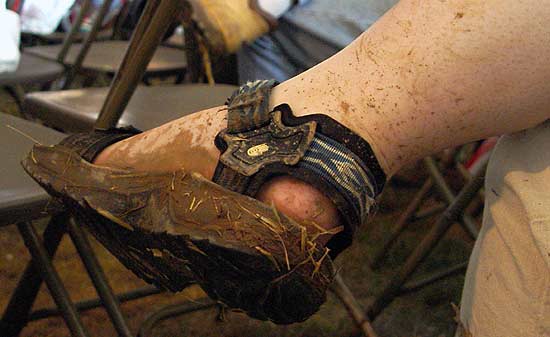
I'm totally wiped and have had a couple of bottles of cider from an Irish pub in Somerville, so I don't know how eloquent I can be. Suffice it to say--the day was good, jam-packed with poetry. So much so, you sort of want to take shower and change clothes between different portions of the day. This is not a bad thing, but by the time the day has ended, we all sort of look like we've been moving house all day. Some sort of dazed and in need of a beer. At least that's my take on it. The Guinness looked good, the cider tasted better, though. So that's what we did. Left just after 9:45pm just as Sharon Olds and Galway Kinnell were winding up a poetic conversation about marriage where they read each other's poems and other poet's work to span a couple's life in all the stages of marriage. Really beautiful! We skipped out a bit early, though. We were tired and hungry and wanted to beat the crowds out of the parking lot.
I've got pages and pages of notes from each of the panels, and these will weave their way into my blog one way or the other over time.
I felt like the great democratizing unifier was muddy shoes (as you can see from the above picture of a woman's muddy shoe sitting to our left). High heeled, sneakers and sandaled feet, gumboots and knee high black boots all dipped in the same fondue of mud.
I bless the rain gods for leaving it overcast but never bringing on the predicted thunderstorms. Thank goodness for that.
I bought a beautiful warm hand made sweater and wound up rapped in it snug as a bug in that proverbial rug.
And on that snuggly note, I must sleep. As there is another final day to conquer at this festival. Where I've had such a good time.
More to follow...
October 1, 2004
Dodge Report. Friday October 1st
Made it! Whew! I'm in the Main Stage Tent listening to Sharon Olds read her work. It's supposed to be a conversation about Poets on Poetry, but we came late and I don't mind listening to her at all. Just a tad disappointed not to hear her speak about craft.
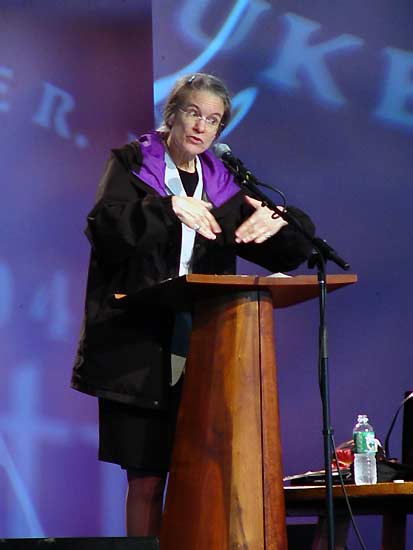 Let me back up and talk about the MUD! They don't seem prepared for this damp.
The ground is soaked! They've sprinkled hay to make trails passable, but it's
really bad. Everyone has mud slung up around their shoes and ankles. It reminds
me of a State Fair. The crowds aren't as bad as I thought they would be. Everyone
is pretty calm, contemplative even. Lots of gray hair and balding heads. (Note
to self: remember to write a poem about underwear) There are more women than
men, but not by too much. (More specifically, write a bra poem) Lots of younger
people, too, I'm happy to say. This is just a poet's wet dream. Too bad we
can't be 5 places at once and see everyone we'd like to see. The choices are
tough. The tent is filling up with Billy Collins fans. He's up
next in here. What! Just found out he's sick, has just been released from the
hospital and won't
be here until Sunday. And that's a BIG maybe. Thank goodness for my backup
plan. I know exactly who to see.
Let me back up and talk about the MUD! They don't seem prepared for this damp.
The ground is soaked! They've sprinkled hay to make trails passable, but it's
really bad. Everyone has mud slung up around their shoes and ankles. It reminds
me of a State Fair. The crowds aren't as bad as I thought they would be. Everyone
is pretty calm, contemplative even. Lots of gray hair and balding heads. (Note
to self: remember to write a poem about underwear) There are more women than
men, but not by too much. (More specifically, write a bra poem) Lots of younger
people, too, I'm happy to say. This is just a poet's wet dream. Too bad we
can't be 5 places at once and see everyone we'd like to see. The choices are
tough. The tent is filling up with Billy Collins fans. He's up
next in here. What! Just found out he's sick, has just been released from the
hospital and won't
be here until Sunday. And that's a BIG maybe. Thank goodness for my backup
plan. I know exactly who to see. Side note: Poets are really into dissing Billy. Not in a bad way, but more in a snickering way. He IS the stand-up poet. Makes people laugh, makes people sigh. It's inevitable. Even if some are sighing with a roll of the eye. Me, though, I see there's enough pain in the world and love the way Billy makes me see the beautiful and bittersweet side of life. You know, he is the reason I came here and I'm allowing myself to be bummed for about two minutes that he's not. There that's done, then. Hell, I'm not even wondering how he is or if he's okay. So selfish of me. Anyway, now I'm over it and am happily heading off to see Philip Levine talk about Poets on Poetry.
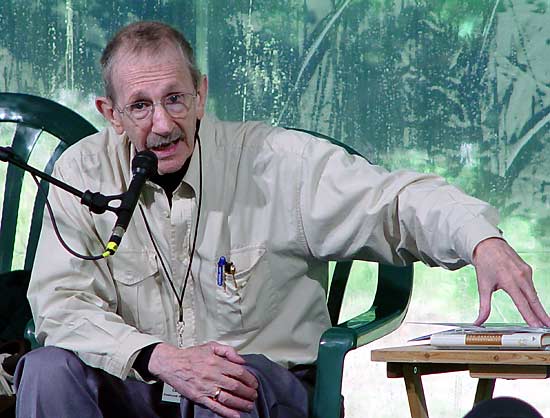
Philip Levine is great. He's funny and harsh. He talks about when he was a teacher making his students cry. Of course, I wonder at their potential and wonder how he would have reacted to my work. Would I have cried? As an underclassman, I'm sure of it. He says out of all the students he taught his favorites were from Cal State at Fresno. He says this is because none of them ever cried. He sees the reason for this because they were used to failing and it was no surprise to them to then fail. Whereas, the kids from the prestigious schools were more used to perfection. Something like that. I'm condensing.
Both he and Sharon talk about the idea of it taking a load of bad poems to write good ones. Here's a quote from Philip: "There's always going to be a lot of bad poems in great poets." I'm paraphrasing Sharon here: When you draft a poem, no one will ever see it. Unless you go back and type it up. But to write it down doesn't take bravery. If in the middle of the poem music enters, it's luck. The truth enters to allow us to cross the line. That's art. Enough air, clarity, light enters to want to share it.
I don't see it the same way, I suppose. But I'm still young to this. I see a lot of poems don't go anywhere, but I don't call them "bad." Or think of them particularly. They don't scar me or scare me in any way. They are just what they are: fodder. I can't get to the "great" stuff without them. But I still hold a fondness for my creative process. I'm not so jaded. I take that back, there are some poems I wrote as a young teenager that I am mortified of. But they're still dear to me. The worst being a poem about a man getting arrested and wondering who was going to feed his fish. I'm always that person who wonders what's going to happen to the family pet when someone dies in a movie. Such a sap, I know it.
What else? Lunch was fine. Big tent, big crowds. Coldish food. But when you're hungry, anything tastes good. They had pizza, hoagies, salads, hamburgers, and hot dogs, etc. We sat with some poetry groupies. One who was a veteran and knew everything about all the poets. She's going to George Mason and was sure I'd never heard of it. I had. She was speaking about low res and "high res" (what I call full-time school) and the benefits of each. She thinks it's so beneficial to be able to be in a community of writers and see how they're writing grows over the two years together. Yes, but I can't go anywhere. I'm married and reside in San Francisco. So, she says, I need to be dedicated enough to stick to the lonely deadlines. I think I could do it. I just don't know where I am right now as far as wanting feedback is concerned. I'm not even sure about my output. One good poem a month is good enough for me. (There I go with the good/bad fallacy.) How about: one strong poem per month, instead. I'm really at this point tuning in to the words, the word choice, listening for that inner music and learning what pleases MY ear. I feel it's imperative for me to know this first, before I share my work with others for criticism. So I won't cry. Ha! No, so I know my why's and wherefore's.
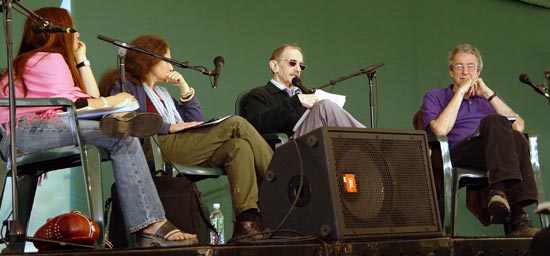
Lastly, I went to see a panel discussion called: Poetry as Disruptive Seed/as Centering Force with Marilyn Chin, Jane Hirshfield, Philip Levine, and C.K. Williams. Mostly they discussed how the didn't really get the meaning of the discussion. Marilyn interpreted it by reading 25 brash haiku's, Jane saw it as the difference between poems that console and poems that distress. The obvious choice is to want to "distress" rather than console, obviously. But she made a good point, that it's out of our hands and in the hands of the reader what will console and what will distress. I thought that was a really good point. And part of why it's important to get our poems out there and let them live there own lives separate from us. Philip says we need to meet the urgency with whatever craft we've amassed. Disruptive versus calm, soothing. C.K. thought that the term "centering" was new age and balked against it. He read a "disruptive" poem by Philip Larkin called This Be the Verse.
The conversation turned, of course, to the state of the world. How could it not with poetry as "disruptive seed." Levine says it's years before we'll be able to write about this. Says Yusef is just now writing his "good stuff" about his war experience. Chin quoted Auden: "Poetry Makes Nothing Happen." CK talks about read-ins during the Vietnam war being one of the first forms of protest about war, but probably having no effect. Philip says the same people who architect the war are those who decide to end it because it isn't profitable anymore. Jane says Ceylon wrote, "Say out what you say." And it is everyone's responsibility to "say out what you say." There could be a cultural evolution that spurned from just one outcry. That one touches another and another and soon a change in consensus transpires.
Now I'm back in my hotel having a glass of wine and something to eat. We will get there even earlier tomorrow. Oh, one thing I notice is the sound of frogs and crickets. How I miss that natural "noise"!
|

